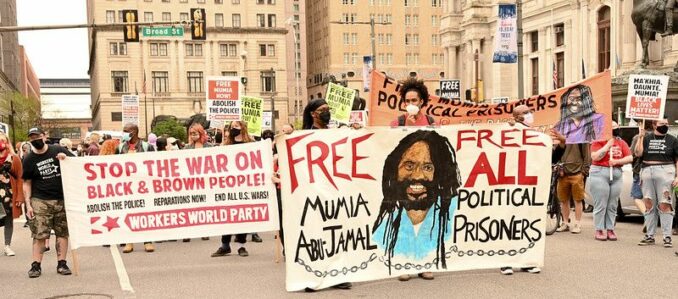‘The Mumia exception’
Philadelphia
For 41 years, journalist Mumia Abu-Jamal has been unjustly imprisoned for the murder of a Philadelphia police officer. His case comes before Philadelphia Common Pleas Court Judge Lucretia Clemons on Dec. 16 for what may well be a final appeal hearing.

Demonstration in Philadelphia, April 24, 2021. WW Photo: Joe Piette
Mumia’s case has been fraught with police, judicial and prosecutorial misconduct and rampant racism. Journalist Linn Washington Jr. coined the phrase “the Mumia exception” to describe how courts routinely deny Abu-Jamal the same legal rights extended to others challenging unjust convictions.
In a recent essay titled “Cruel and unusual: How the justice system is failing Mumia Abu-Jamal,” Washington explains the unusual pattern of rulings: “These judges have denied Abu-Jamal the legal relief that others convicted of murder — who asserted violations of their legal rights — were granted. For example, during the 28 years after Abu-Jamal’s arrest, Philadelphia and Pennsylvania appellate court judges overturned 86 Philadelphia death penalty convictions, due to various errors by police, prosecutors, defense attorneys and even judges — including the judge at Abu-Jamal’s 1982 trial. (tinyurl.com/yc3hmeuf)
“However, during that time frame, judges declared not a single error — evidentiary or procedural — existed anywhere in the Abu-Jamal case, despite the persistent emergence of compelling new evidence that undermined all elements of his conviction.
“The fact that state and federal judges have consistently upheld Abu-Jamal’s conviction is cited as solid confirmation of his guilt. Brushed aside is the fact that judges have upheld Abu-Jamal’s conviction by skirting established legal procedure (precedence), creating new legal standards that undercut Abu-Jamal’s claims and rejecting newly discovered evidence of improprieties by police, prosecutors and even judges.
“An analysis of Abu-Jamal’s case by Amnesty International in 2000 tracked the Pennsylvania Supreme Court’s 1986 establishment of a standard that prohibited particular remarks prosecutors could make to a jury. Pennsylvania’s highest court reversed that standard, when it rejected Abu-Jamal’s first appeal in 1989. A year later that standard was reinstated.”
Judge Clemons, following in the footsteps of her predecessors, claims a judicial “time bar” prohibits new evidence — from six boxes of Abu-Jamal case material, including evidence of racism in jury selection, hidden in the District Attorney’s office for 36 years — from being heard, despite U.S. and Pennsylvania law that requires prosecutors to promptly disclose evidence favorable to an accused person.
Clemons announced her intent to reject Abu-Jamal’s request for a new trial. But where there is clear evidence of racial bias, as there is throughout Mumia’s case, no “time-bar” should apply.

